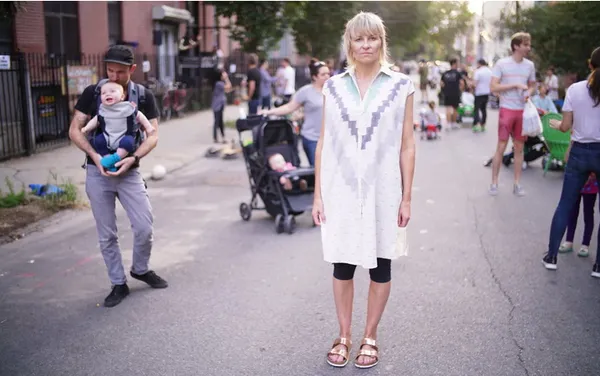Eye For Film >> Movies >> To Kid Or Not To Kid (2018) Film Review
To Kid Or Not To Kid
Reviewed by: Jennie Kermode

In the UK today, around 20% of people never have their own biological children. In the US it's 15%. In both countries, the number has been increasing, not in line with infertility rates but simply because more people are making the choice to break with traditional expectations. This does not, however, mean that individual choices have become easy.
Reaching her forties, filmmaker Maxine Trump realised that her own choice was going to have to be made very soon or it would be taken out of her hands. She felt a strong need to discuss it with others, to help her sort out her own thoughts, but this was a conversation that nobody seemed to be having - in most of the US, the idea of being childless by choice is still a taboo subject. This documentary emerged from her personal journey, charting the factors that influenced her decision and incorporating pieces of conversations she undertook with women happy to discuss their own.
There's a lot here to get to grips with. Watching it in the UK, which largely got over arguments about women's essential feminine nature and religious duty several decades ago, it's both fascinating and horrifying to observe some of the pressures US women are subjected to - and this is very much about women, with men, questioned towards the end of the film, struggling to understand why choosing not to have children would be a big deal. Other things are, sadly, more universal, and many women will find all too familiar the reluctance of medical professionals to help a woman who has been certain for years that she doesn't want children to get rid of the reproductive organs that are causing her nothing but suffering. Running throughout is the lingering cultural belief that women like this don't know their own minds, will change their minds, or are dooming themselves to an existence in which they can never know true happiness (in fact - though it's not mentioned here - studies consistently find that people who don't have children are happier overall than those who do).
Whilst it may be more important to create room for those voices less often heard, the film is not completely one sided. in one scene, two best friends (whose differently shaped bodies tell a story of their own) discuss how one of them has found great joy in having four children whilst supporting the other's decision to have none. Maxine visits a woman with seven children who play noisily around her during the interview, creating constant distractions - an illustration in itself of how much fun kids can be and how much effort they require. There's some discussion of the notion of 'having it all' and the way that ambition intersects with reality, though little on the idea of male partners doing their fair share of child rearing.
Mostly limited to white women with majority cultural backgrounds, the film is fairly narrow in scope, but there's never a suggestion that it's anything more than a starting point - an opening statement in what needs to become a much wider cultural conversation. Maxine does look at what's happening in some other countries, where concerns about falling birth rates are being met with pro-reproduction media campaigns and even cash bribes for new parents, but the focus is very much on wealthy countries, with little said about the relationship between falling birth rates and rising prosperity in other parts of the world, and there's no attempt to take on the relationship between ageing populations and immigration. Instead, the subject is dealt with in a very personal way, which is doubtless what many viewers will need in order to start having these conversations themselves.
There's quite a bit of repetition here - perhaps a difficult thing to avoid when asking questions that have been swirling around in one's own head non-stop for months. Overall the film might benefit from a tighter edit, but Maxine herself makes a good anchor and viewers facing the same situation will find her easy to relate to. Underlying threads of existential horror at the ways in which women are still denied bodily autonomy are managed well so as not to overwhelm other aspects of the discussion. The film gently invites viewers to recognise their own agency in regard to reproduction, and that might be a starting point for a more far-reaching self-actualisation.
Reviewed on: 18 Jun 2020

















